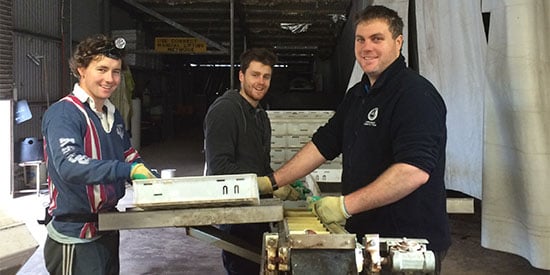Students help expanding abalone business
Deakin newsWhile the local oceans have been a perfect breeding ground for Southern Ocean Mariculture’s (SOM) abalone farming, the Deakin University Warrnambool Campus has been the perfect breeding ground for its staff.
Of SOM’s 11 staff members directly involved in abalone husbandry, 10 are Deakin graduates and each year, 10 or more Warrnambool aquatic science students complete work placements at the abalone farm.

(L-R: Deakin graduates Joe Holt, Tim Carew and Lachlan Hulands, working on a grader at SOM)
Deakin University Warrnambool Campus CEO, Grant Sutherland said the placements were an excellent example of the University’s connections with regional industry.
“One of the advantages of studying at Warrnambool is that we offer many options for real industry experience,” Mr Sutherland said.
“These students get a taste of where they want to work and at the same time gain valuable industry experience which helps their future employment prospects,” he said.
SOM general manager, Mark Gervis said it was a beneficial partnership that worked both ways.
“When we started in 1996 we had a high number of researchers assisting to get the farming methodology to a commercial level,” Mr Gervis said. “We were at the pioneering end of things and that support was invaluable.”
Since then, SOM has been using Deakin students on a casual basis and for additional work when required.
“This year so far we’ve had nearly 20 work experience students from Deakin,” Mr Gervis said.
Students also complete casual work over holidays and between lectures and in some cases are offered internships to give them industry experience.
“We have a pretty stable management team and so we can’t offer many a long-term career path, but we can provide a year’s worth of work which helps us by having engaged and knowledgeable staff and helps these graduates gain relevant aquaculture experience to add to their CV,” Mr Gervis said.
During work placements, students help the husbandry teams with activities such as feeding, cleaning, grading and harvesting.
“It’s been fantastic for us and it works both ways,” Mr Gervis said. “We know we have access to people with the background knowledge of biology to look after our animals, and they get relevant experience on their resume.”
The business is about to undergo a major expansion with 96 new 50m2 abalone culture tanks which will take the average tonnage from 75 to 110.
Share this story
Key Fact
Deakin students secure successful work placements in local abalone industry.
